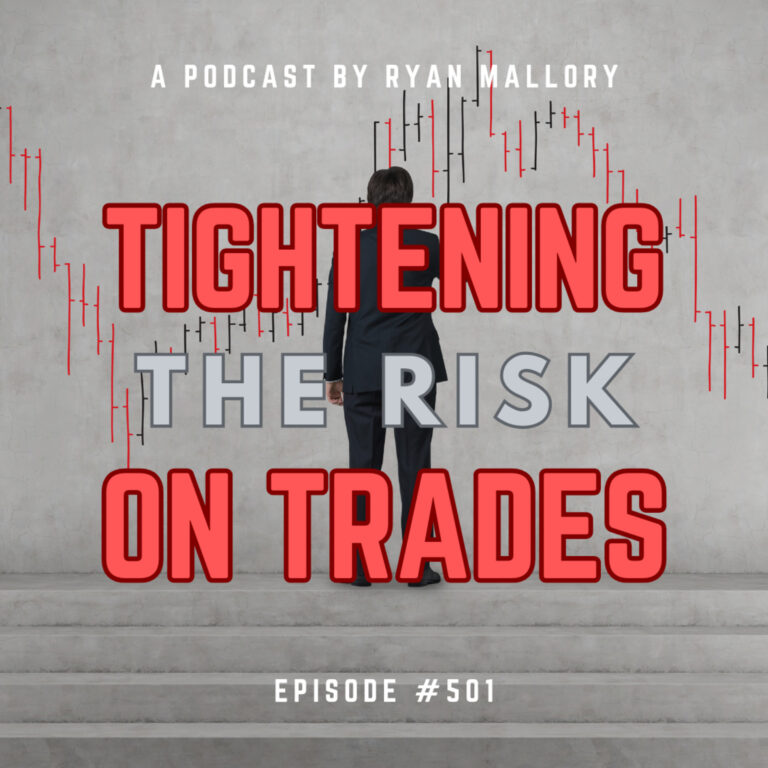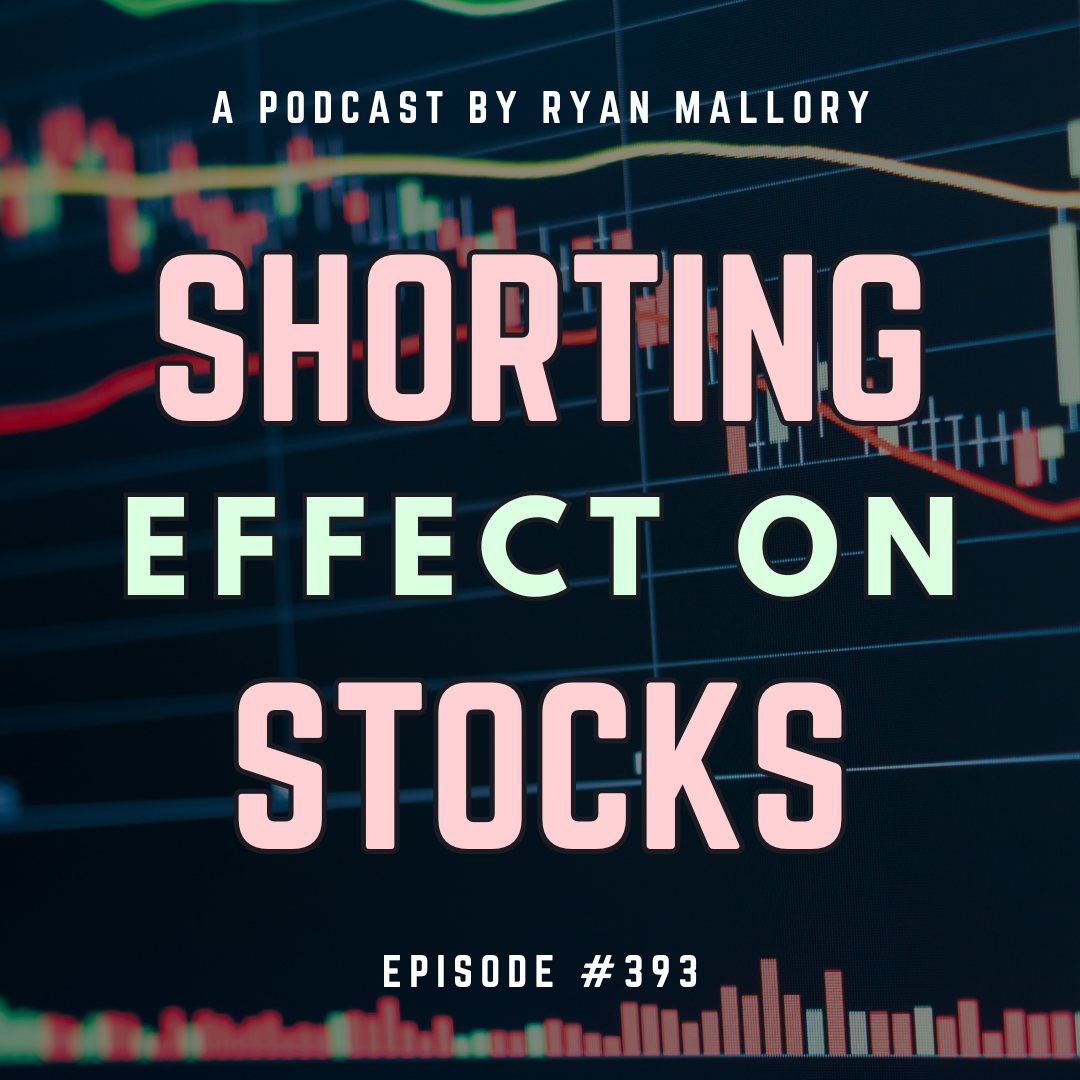Episode Overview
Does shorting stocks cause companies to go bankrupt or drastically impact their stock prices? In this episode, Ryan dives into the details of shorting stocks and what it means to individual companies that are on the receiving end of short selling.
Available on: Apple Podcasts | Spotify | Amazon | YouTube
Episode Highlights & Timestamps
- [0:07] Introduction
Ryan introduces the episode and teases the topic: Does short selling drive a stock price down or push companies into bankruptcy? - [1:04] “Lou” Asks About AMC and Short Selling
A listener nicknamed “Lou” questions whether short selling companies like AMC is ethical or responsible for sending them into bankruptcy. - [2:35] Ryan’s Experience and View on Shorting
Ryan discusses his background in shorting, and why he avoids low-priced, high-volatility stocks like AMC due to headline risk. - [5:16] Does Short Selling Drive Companies into Bankruptcy?
He debunks the myth that short selling alone can bankrupt companies, explaining how it’s the inverse of regular buying and selling. - [6:43] Why the Market Needs Short Sellers
Ryan highlights how short sellers create liquidity and play a vital role in creating market bottoms by covering their positions.
Key Takeaways from This Episode:
- Short Selling Isn’t the Villain: It doesn’t bankrupt companies, poor fundamentals usually do.
- Avoid Low-Dollar Stocks: Stocks under $10 with high volatility and headline risk (like AMC) are dangerous to short.
- Short Sellers Help Create Market Bottoms: Their covering often initiates major rallies.
- CFDs vs. Real Shorting: CFD trades don’t impact stock prices because the actual shares aren’t being traded.
- Liquidity Matters: Banning short selling often removes the very fuel that leads to rebounds.
Resources & Links Mentioned:
- Swing Trading the Stock Market – Daily market analysis, trade setups, and insights by Ryan Mallory.
- Join the SharePlanner Trading Block – Get real-time trade alerts and community support.

Take the Next Step:
✅ Stay Connected: Subscribe to Ryan’s newsletter to get free access to Ryan’s Swing Trading Resource Library, along with receiving actionable swing trading strategies and risk management tips delivered straight to your inbox.
📈 Level Up Your Trading: Ready for structured training? Enroll in Ryan’s Swing Trading Mastery Course, The Self-Made Trader, and get the complete trading course, from the foundational elements of trading to advanced setups and profitable strategies.
📲 Join the Trading Community: Sign up for SharePlanner’s Trading Block to become part of Ryan’s swing-trading community, which includes all of Ryan’s real-time swing trades and live market analysis.
Full Episode Transcript
Click here to read the full transcript
0:07
Hey, I’m Ryan Mallory and this is my Swing Trading the Stock Market podcast. I’m here to teach you how to trade in a complex, ever changing world of finance.
0:16
Learn what it means to trade profitably and consistently, managing risk, avoiding the pitfalls of trading, and most importantly, to let those winners run wild.
0:25
You can succeed at the stock market and I’m ready to show you how. Hey everybody, this is Ryan Mallory with Swing Trading the Stock Market.
0:33
In today’s podcast episode, we’re going to talk about what shorting a stock does to a share price. So pretty unique e-mail here.
0:43
I don’t think I’ve ever actually addressed this topic before on the podcast so I thought it might be a good opportunity to do so, this e-mail writes Hi Ryan help.
0:52
And before I forget, how can I forget this with each e-mail? I never use anybody’s real names.
0:58
I always just give them a good healthy Florida redneck name. So for this podcast.
1:04
So I’m giving him the old name of Lou and Lou writes hi Ryan. Does short selling drive down a stock price?
1:13
I saw a comment on my feed regarding AMC. I know you love talking about this stock with the laughing emoji.
1:19
I saw a potential short opportunity recently and I posted about it and I got a lot of feedback from someone who loves AMC.
1:26
They said they are buying and holding because they want to support cinema into the future. And with that comment he also provided me with that little rolling the eye emoji, which I would
1:34
agree with as well. He said that short selling drives stock prices down and companies into bankruptcy.
1:40
Is this true? I can’t seem to find anything conclusive on the Internet.
1:44
My broker only offers short selling through contract for difference CFD. From my understanding, CFD trading is a 0 sum market That doesn’t affect the stock because you are
1:56
betting on the increase or decrease of a stock. If you could shed some light on this issue it’d be most appreciated.
2:04
All right. So right out of the way, I don’t have any experience in CFDS.
2:07
I don’t even think that stuff’s legal in the United States. But essentially I’m just reading off of a website.
2:12
How does CFDS work? What is a CFD?
2:14
It’s short for contract for differences. It’s a form of a financial derivative in which two parties agree to trade a contract based on an
2:21
assets future price speculation. So in the US, the reason why it’s frowned upon is because it bypasses the regulatory agencies.
2:27
But yeah, CFD is not gonna have any impact on the actual company itself because you’re not really trading the stocks itself.
2:35
But if I’m looking at just shorting in general, does shorting drive a stock into bankruptcy? Now I’ve shorted plenty of things in my lifetime.
2:43
I’ve shorted individual stocks, I’ve shorted indices, I’ve shorted futures, I’ve, I’ve done it all pretty much.
2:49
But as far as like AMC, First off, one of the things I would say, I’d never short AMC.
2:57
It’s a like, what, a $4.00 stock and it has immense headline risks. So you start getting down into the stocks that are trading at less than $10, you’re really setting
3:06
yourself up for disaster because AMC could get bought out. It could. I mean, I don’t think it will, but it could. Plenty of companies I didn’t think would get bought out, and they have been over the years. It’s just matter of fact, somebody takes enough of an interest. Maybe Apple says, hey, you know what, alongside of Apple TV, we’re gonna start having some movie theaters as well. We’re gonna go ahead and buy AMC.
3:25
They can buy it with pocket change practically at this point. And if they did, that stock’s gonna shoot through the roof.
3:31
And if you’re short on it, you’re gonna be paying the the buyout price and that could be 6080 hundred, 200% higher than where it’s trading at.
3:39
Who knows, but you’re gonna be responsible for it. So shorting a stock like AMC or anything that has incredible amounts of headline risk and especially those that are priced really low, the potential for disaster is extremely high. It’ll ruin your portfolio if you’re caught on the wrong end.
3:55
I mean, look at the stuff that AMC has done. I mean, they’re constantly out there trying to figure out new ways to get their share price out of the seller.
4:02
I mean then they just like split their stock up and create another stock symbol called APE last year or the year before that.
4:09
So it’s really a dangerous thing when you start shorting these low dollar stocks.
4:16
So the first thing I would say is never short stocks that are under $10. Just as a rule of thumb, I probably wouldn’t even trade or short anything that isn’t a large cap.
4:26
I mean, if I was the ones that I like to short the most are the indices. Why?
4:30
Because you can’t really buy out the indices. Yes, you can have some headline events that drives it higher, but because there’s 500 companies involved like on SPY or 100 on the NASDAQ 100, it gets a little bit more diluted. Or if you’re gonna short Apple, fine.
4:42
But how many people over the years had all that much success shorting Apple, especially from a long term standpoint or Microsoft or Tesla.
4:50
Now I’m not saying go out and short these things. I’m definitely not saying that.
4:54
Do your own due diligence, all that stuff. This is not investment advice, but from a personal perspective I’m gonna short a stock.
5:00
It’s not gonna be something like AMC that could get bought out, that could have some crazy headline that spikes the stock two or three 100%.
5:07
I mean, how many times have you seen a stock go up two or three, 100% over the last couple of years? It’s a lot.
5:12
So with that out of the way, the short selling drive companies in the bankruptcy? No, they don’t.
5:16
I mean really, what does short selling do? It’s essentially the exact opposite of what buyers do.
5:21
Buyers buy and then when the stock price goes high enough, they sell. They don’t say, hey, you’re driving that company into bankruptcy for selling that stock after you’ve made 150% over the last 10 years.
5:29
Nobody says that.
5:33
But if you short a stock, you’re like, man, you’re gonna drive this company into bankruptcy and you’re not.
5:39
You’re shorting the stock. You’re selling the stock first.
5:41
That’s all you’re doing. You’re borrowing the shares from your broker and you’re selling it on the open market and then you have an obligation to buy them back.
5:45
Now, nobody ever complaints when short sellers have to buy those shares back.
5:50
And often times when you look at some of the great market bounces, you’ll see that they usually start with short sellers finally covering their positions in mass.
6:01
And when they start covering it in mass, it creates this huge groundswell of a bounce in the market. And the markets start to finally put a bottom in because they’re not shorting again.
6:09
And so you have all this buying sport, plus you have the legitimate buyers that are buying and then selling.
6:14
They’re coming back into the market because they’re seeing all that buying. And then you’re having the short sellers covering, and then you have the buyers they’re buying and all of a sudden you have a huge freaking market, right?
6:20
That’s why the biggest market rallies happen at the very beginning.
6:27
Typically, I’ve seen a lot of crazy rallies here over the last few months, that’s for sure. But typically your biggest rallies will happen off of a new market low and that’s because you have such an influx of new buyers and people covering their short positions all at the same time.
6:37
I mean, think about it.
6:43
Ask yourself, where are you more likely to see a four or 5% move in the S&P 500? Are you going to see it when it’s making new all time highs?
6:51
No, Usually it’s kind of like just putzing along at that point or are you likely to see it after the markets declined 30 or 40% and people are completely lost their minds and the market’s completely stretched then with very little sellers left because they’ve already been doing all their selling.
7:02
That’s usually where you see the big market move.
7:09
So when you see like these foreign countries, when these countries and you see it like in China and you see it in, you’ve seen in the United States, I remember in 2008 they were like, oh, you can’t short the banks anymore and what do you think?
7:17
That’s never good for the market.
7:22
And the reason why I say that is because the market needs short sellers. They provide a lot of liquidity for the market.
7:28
And so when you take them out of the picture, well there’s nobody gonna be covering anything either, is there?
7:32
You can blame it all you want on short sellers for why the market goes down, but then when you want the market to go back up, you don’t have those short sellers there to be covering their positions because you banned them from the market.
7:39
So history shows banning short selling really isn’t a good thing.
7:44
It definitely prolongs market sell offs because major market bottoms comes from the covering by short sellers.
7:52
I mean just look at some of the price action of late.
7:58
For instance, yesterday we had the CPI report come out, market sold off really hard, sold off all day long and then the S&P 500 down like a / 100 points at one point.
8:08
And then by the end of the day in the last hour of trading we’re only down 70 points, still a lot.
8:10
But why was it not more? It’s because the short sellers cover their positions.
8:14
I’m going to go ahead and get long as well, plenty of those as well.
8:21
But those short sellers, they’re covering their positions because they don’t trust the market not to bounce the next day because of self fulfilling prophecy and the market rallies, that’s what.
8:30
Again, that’s why you see so many heavy sell offs with that end of day buying that takes place And yeah, sure you could have this big hedge fund, you could have Citron or you could have Bill Ackman come around and and just short a stock on the Russell 2000 until oblivion.
8:40
Sure that’s possible. OK.
8:42
They have that potential to do that if they wanted to. But are they really doing that?
8:46
No. I mean, I think they got bigger fish and fry.
8:48
I think they’d rather, you know, buy or sell stocks at much larger companies. Can they do that to Apple?
8:54
No. So if a company’s gonna go out of business, there’s usually a fundamental reason for why they’re going out of business.
8:58
Short sellers realize that and they’re gonna pounce on it.
9:01
But it’s not gonna be because you or me do it. It’s gonna be because the collective body of short sellers are doing it because there’s an opportunity there.
9:07
If all the short sellers got together and said, hey, let’s go short, Apple probably wouldn’t make too much of A dent in that, and there’ll probably be way too many buyers.
9:12
That any percentage point that you were able to send it down lower, there’d be probably plenty of buyers that would be willing to come in there and scoop it right back up again.
9:20
And on the flip side, too, I think, especially on social media sites, the term short squeeze is way overused.
9:32
Every rally now seems to be the bears are getting squeezed.
9:38
No, sometimes it’s just a legitimate rally. Most of the time it’s a legitimate rally.
9:42
Buyers are overwhelming the sellers. The short sellers are such a small percentage of the overwhelming market participants.
9:52
Yes, they short squeezes happen. Yes, markets can go up because of the covering, just like I’ve already said.
10:00
But is every rally because of a short squeeze? No.
10:02
And that’s what you get. A lot of times you get everybody want to say the short squeeze, it’s taking place.
10:08
They’ll even add it on the message boards. They’ll add like 15 ES to the squeeze.
10:13
Thinking in that makes it even more pronounced. But that’s just not necessarily so.
10:18
One thing that is necessarily so swingtradingthestockmarket.com. Check it out.
10:22
Really think you guys will like it? You’re gonna get all my stock market research each and every day.
10:27
This is my platform where I provide a daily watch list. My watch list reviews my bullish and bearish list, the stocks that I’m following each and every week.
10:36
Plus you’re gonna get big tech updates and updates on the overall stock market throughout the week.
10:42
So check that out. swingtradeinthestockmarket.com.
10:49
And for those who don’t know what short selling is, maybe I should have talked about this in the very beginning.
10:55
Short selling is essentially where you’re selling a stock 1st and then buying it back later.
10:58
You’re borrowing it from your broker. And so on A platform like thinkorswim, it’s just a matter of hitting the sell button instead of the buy button.
11:05
And it would be like if I borrowed a pair of sunglasses from you and I said, hey, let me borrow that pair of sunglasses.
11:12
And then I found somebody while I was borrowing those sunglasses that was willing to buy them off of me for $100.
11:18
I’m like, all right, sure, now I might not have to give you back those sunglasses for a couple months.
11:23
Isn’t that what usually happens to you?
11:26
Let somebody borrow something and you don’t see it for like another year or two or you had to make that awkward.
11:32
We were like, hey, you know that that tool I let you borrow, You think I could get that back finally.
11:37
And you’re like, yeah, yeah, I forgot all about that. Yeah, yeah, yeah, let me go get it.
11:40
I didn’t forget about it. But nonetheless, when it comes to this pair of glasses, you sell it to somebody else.
11:47
You still owe your friend that pair of glasses that he let you borrow. But you find that same pair of glasses on eBay for $60.00 and you give him back his sunglasses and
11:56
he’s like, all right, great, Thanks for giving it back. Like you said.
11:59
And you only had to pay $60 to get them those glasses back. So you profited 40 bucks from that.
12:04
And it’s the same thing with stocks. You’re shorting a stock by borrowing the shares from your broker.
12:10
You’re selling it on the open market, hoping that it goes down, and then you’re buying it back later on and giving it back.
12:16
Now it can work against you. You know, those pair of sunglasses, maybe they become antique and all of a sudden they’re worth $300.00, and then all of a sudden you’re paying $300 to get to your friend’s sunglasses back.
12:32
You’re gonna be paying $200, you’re probably gonna be getting a call from your brokers like, hey, what the heck are you doing here, man?
12:37
You’re you better, you better give us some money or we’re gonna close out the position.
12:44
But overall, do I think that short selling causes a company to go bankrupt? No, not really.
12:51
But do I think it can drive down the stock price? Yeah, I mean, if you get enough short sellers, it can push the stock down.
12:55
I mean, it’s laws of supply and demand. More sellers than buyers, stocks going to go down.
13:01
I’d avoid the shorting the low dollar stocks though, like AMC, Man, that’s like a ticking time bomb.
13:09
If they just have one good news piece, you could get in a margin call the next day.
13:15
Remember, when we’re in these big market sell offs, it’s easy to blame the short sellers, but they’re also the same people that create the market.
13:22
Bottom maybe enjoy this podcast episode. I would encourage you to give me a five star review on whatever platform you’re listening to.
13:26
Plus shoot me your questions, Shoot me your stories. I love to hear from you guys.
13:34
On it, check out swingtradeinthestockmarket.com Thank you and God bless.
13:44
Thanks for listening to my podcast Swing Trading the Stock Market.
13:51
With your membership, you will get a seven day trial and access to my trading room including alerts via text, e-mail and WhatsApp.
13:58
So go ahead, sign up by going to shareplanner.com/trading Block, that’s www.shareplanner.com/trading-block and follow me on SharePlanner’s Twitter, Instagram and Facebook where I provide unique market and trading information every day.
14:11
You have any questions, please feel free to e-mail me at ryan@shareplanner.com.
14:19
All the best to you and I look forward to trading with you soon.
Enjoy this episode? Please leave a 5-star review and share your feedback! It helps others find the podcast and enables Ryan to produce more content that benefits the trading community.
Have a question or story to share? Email Ryan and your experience could be featured in an upcoming episode!
Become part of the Trading Block and get my trades, and learn how I manage them for consistent profits. With your subscription you will get my real-time trade setups via Discord and email, as well as become part of an incredibly helpful and knowledgeable community of traders to grow and learn with. If you’re not sure it is for you, don’t worry, because you get a Free 7-Day Trial. So Sign Up Today!

Welcome to Swing Trading the Stock Market Podcast!
I want you to become a better trader, and you know what? You absolutely can!
Commit these three rules to memory and to your trading:
#1: Manage the RISK ALWAYS!
#2: Keep the Losses Small
#3: Do #1 & #2 and the profits will take care of themselves.
That’s right, successful swing-trading is about managing the risk, and with Swing Trading the Stock Market podcast, I encourage you to email me (ryan@shareplanner.com) your questions, and there’s a good chance I’ll make a future podcast out of your stock market related question.
In today's episode, I talk about tightening the risk on the trades and the benefits of taking a multi-pronged approach in doing so between profit taking and raising the stops. Also, I cover how how aggressive one should be in adding new swing trading positions and how many open positions that one should have at any given time.
Be sure to check out my Swing-Trading offering through SharePlanner that goes hand-in-hand with my podcast, offering all of the research, charts and technical analysis on the stock market and individual stocks, not to mention my personal watch-lists, reviews and regular updates on the most popular stocks, including the all-important big tech stocks. Check it out now at: https://www.shareplanner.com/premium-plans
📈 START SWING-TRADING WITH ME! 📈
Click here to subscribe: https://shareplanner.com/tradingblock
— — — — — — — — —
💻 STOCK MARKET TRAINING COURSES 💻
Click here for all of my training courses: https://www.shareplanner.com/trading-academy
– The A-Z of the Self-Made Trader –https://www.shareplanner.com/the-a-z-of-the-self-made-trader
– The Winning Watch-List — https://www.shareplanner.com/winning-watchlist
– Patterns to Profits — https://www.shareplanner.com/patterns-to-profits
– Get 1-on-1 Coaching — https://www.shareplanner.com/coaching
— — — — — — — — —
❤️ SUBSCRIBE TO MY YOUTUBE CHANNEL 📺
Click here to subscribe: https://www.youtube.com/shareplanner?sub_confirmation=1
🎧 LISTEN TO MY PODCAST 🎵
Click here to listen to my podcast: https://open.spotify.com/show/5Nn7MhTB9HJSyQ0C6bMKXI
— — — — — — — — —
💰 FREE RESOURCES 💰
— — — — — — — — —
🛠 TOOLS OF THE TRADE 🛠
Software I use (TC2000): https://bit.ly/2HBdnBm
— — — — — — — — —
📱 FOLLOW SHAREPLANNER ON SOCIAL MEDIA 📱
*Disclaimer: Ryan Mallory is not a financial adviser and this podcast is for entertainment purposes only. Consult your financial adviser before making any decisions.





